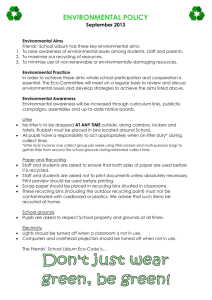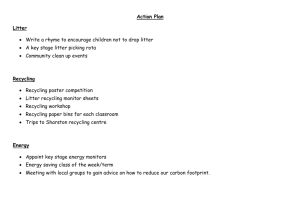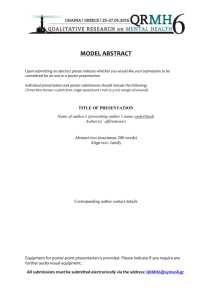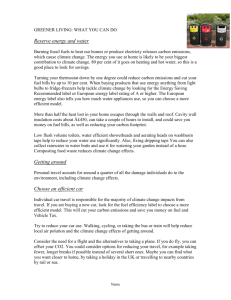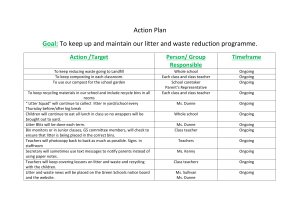Midlands Local Consultation Forum
advertisement
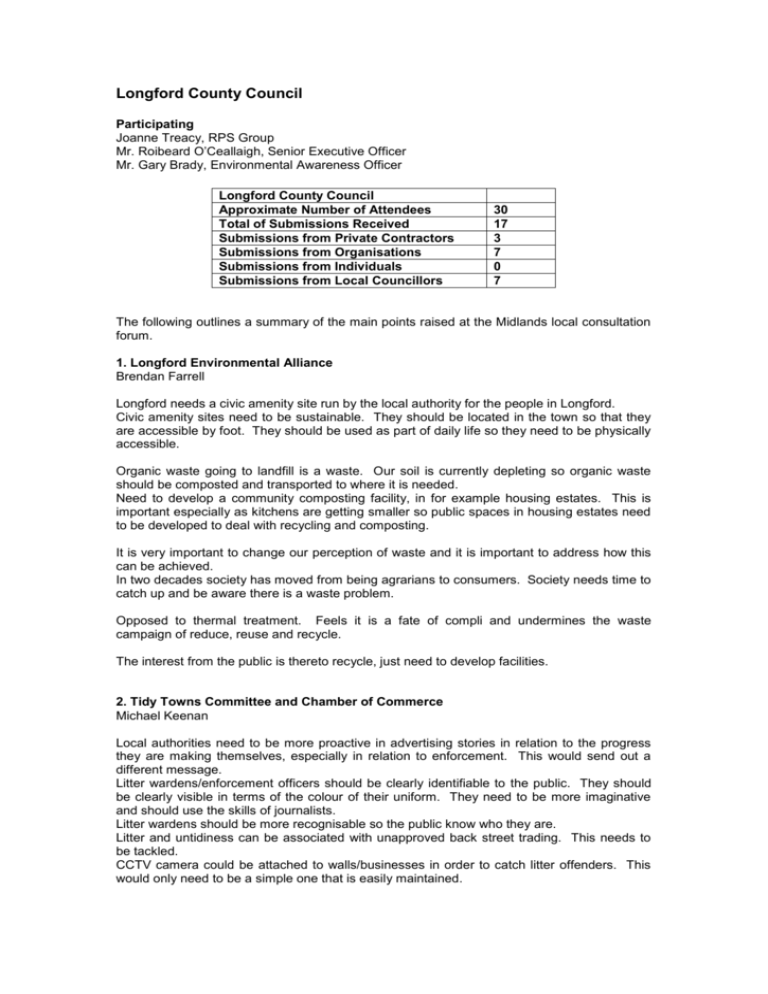
Longford County Council Participating Joanne Treacy, RPS Group Mr. Roibeard O’Ceallaigh, Senior Executive Officer Mr. Gary Brady, Environmental Awareness Officer Longford County Council Approximate Number of Attendees Total of Submissions Received Submissions from Private Contractors Submissions from Organisations Submissions from Individuals Submissions from Local Councillors 30 17 3 7 0 7 The following outlines a summary of the main points raised at the Midlands local consultation forum. 1. Longford Environmental Alliance Brendan Farrell Longford needs a civic amenity site run by the local authority for the people in Longford. Civic amenity sites need to be sustainable. They should be located in the town so that they are accessible by foot. They should be used as part of daily life so they need to be physically accessible. Organic waste going to landfill is a waste. Our soil is currently depleting so organic waste should be composted and transported to where it is needed. Need to develop a community composting facility, in for example housing estates. This is important especially as kitchens are getting smaller so public spaces in housing estates need to be developed to deal with recycling and composting. It is very important to change our perception of waste and it is important to address how this can be achieved. In two decades society has moved from being agrarians to consumers. Society needs time to catch up and be aware there is a waste problem. Opposed to thermal treatment. Feels it is a fate of compli and undermines the waste campaign of reduce, reuse and recycle. The interest from the public is thereto recycle, just need to develop facilities. 2. Tidy Towns Committee and Chamber of Commerce Michael Keenan Local authorities need to be more proactive in advertising stories in relation to the progress they are making themselves, especially in relation to enforcement. This would send out a different message. Litter wardens/enforcement officers should be clearly identifiable to the public. They should be clearly visible in terms of the colour of their uniform. They need to be more imaginative and should use the skills of journalists. Litter wardens should be more recognisable so the public know who they are. Litter and untidiness can be associated with unapproved back street trading. This needs to be tackled. CCTV camera could be attached to walls/businesses in order to catch litter offenders. This would only need to be a simple one that is easily maintained. Section 9 and 20 of the Litter Management Act and section 11 of the Derelict Sites Act enables local authorities to send notices. This section should be utilised more. When local authorities are carrying out works (such as roads projects), more attention needs to be paid to tidy up the area after the works are finished. Should introduce fines for late night littering by youths. A lot of money is invested in picking the litter up the next day. Therefore, the focus and resources should be on prevention. When new estates are built, the period between when the local authority takes over from the builders is too long in terms of maintenance. The local authority needs to get more involved and become involved sooner. A solution could be to place conditions in the planning permissions where developers are obliged to provide bins. There is a lack of co-ordination between different local authorities in a county. Bins are currently damaged from cars parking on footpaths. This damage is costly. Poles should be erected to stop the bins being damaged. The IBAL (Irish Business Against Waste) Competition needs restructuring. The current manner in which it is being prepared is unfair. The overall principal is supported but needs to adopt a fairer approach. The litter plan needs to have more bullet points. Litter plans should also highlight the negatives to show the issues that need to be tackled. Local authorities should set up a litter telephone hotline. Local authorities should also have classified ads in the written media, in the same place and format weekly to raise awareness. 3. Longford Old Persons Network John Shannon and Maeve Brady Concern that items being placed in the blue bins are actually being recycled. Would like to see evidence of where the waste is being recycled. Concerns expressed over ability of the elderly to recycle. If they don’t receive a black bin (many don’t as they don’t produce enough waste), they cannot receive a blue one, so how can they recycle as it is difficult for many of them get to recycling centres. Suggestion of establishing a mobile unit to collect elderlys’ recyclable materials. Recycling needs to be made more accessible and affordable for the elderly. It is difficult for elderly to recycle bulky white goods The quality of bring banks are not up to scratch. The funding for additional waste management shouldn’t fall on the householder. Maybe it should come from income tax as this would exclude the elderly. 4. Plant Hire and Muck Shifting Richard Monaghan Has a business idea of taking in excavated material and builders rubble and recycling it. Has received a permit and planning permission. Query of how illegal movement of waste will be dealt with in the plan. This is of concern to small businesses as those carrying out illegal dumping can put small businesses out of business. 5. PJ Matthews and Sons (Granard Ltd) PJ Matthews The company is limited as to what they can do with waste as there are limited facilities to deal with the size of their waste (such as large concrete blocks). Old quarries would be a suitable place for large sized waste as they are deep enough. They are also a suitable location as they tend to be outside of towns where noise (from the crushing facility) and dust would be less of an issue. Quarries are also a good location for stockpiling waste. Currently trying to crush their waste on site into fines of two sizes on site. It is difficult for them to reuse it as it will not meet the standards and regulations. Suggestion of a standard being set whereby such fines could be used for roadways etc. 6. Mulleady’s Limited Edel Hughes Have plans to establish a biodegradable invessil composting facility in Longford. It is at pre application stage for planning permission. Already have an EPA licence to compost for 10,000 tons and would like to review this to 30,000 tons. In relation to their blue bin system, it was implemented in April 2004 and is working very well. Next year they hope to implement a brown bin system. They are not going down the incinerator route in Mulleady Ltd. Introducing pay-by-weight system in January where they will attach different prices for different bins They also collect commercial waste so overall they deal with 97-98% of waste in Longford. Concern over the level of packaging attached to newspapers. This makes separating the waste very difficult. Suggestion of one permit per contractor instead of having to obtain different permits for every county. The system should be made easier. 7. Longford Environmental Alliance Ray Hogan Longford Environmental Alliance have carried out many projects on household waste. They take a very proactive approach and work in conjunction with the local authority. Is there anything further that they can do as a stakeholder or any other ways in which they could get involved? They should form part of the information campaign. 8. Local Councillor and Principal Denis Glennan Mixed feelings expressed in relation to thermal treatment. The price of chewing gum should be doubled or a biodegradable chewing gum should be developed as it is a huge health issue. There is a lot of litter associated with take-aways. All works (such as roads) carried out should be cleared up properly. This should be included in the contract. Should develop a competition for ‘Tidiest halting Site’ – from the concept of tidy towns. Should develop a competition equivalent to Young Scientist for designs for waste. Need reminders everywhere to remind people to recycle such as on packaging. These reminders should be attractive signs. Need more information and awareness on where the end markets for recycled materials are. This would get people more interested. Should be carried out on a name and shame basis, similar to drink driving campaign. Separating facilities in kitchens need to be more user friendly. Should establish design recommendations for kitchens that include segregation for waste. Should establish a competition to generate ideas. Responsibility for waste should lie with families and not just schools. Should practice what we preach and all waste info should be on recycled paper. 9. Local Councillor Mick Cahill Need to push recycling and minimisation Need to establish a mobile collection unit in rural areas. Community composting should be established. Need more information on composting, such a glossy self-explanatory household manual that will last, which would cover recycling and composting. 10. Local Councillor PJ Reilly Need an output to recycle farm waste such as silage raps, plastic twine and medicine containers. 11. Local Councillor Adrian Farrell Recycling bins should be free and only place a charge on black bins. Problem with notification of when bins are going to be collected. Language barrier between local authority and foreigners. Would like to see more civic amenity sites established. Is there a market for recycled materials? 12. Edgewardstown Heritage and Historical Society John and Anne McGerr There should be a lot more uses for tires from motor cars. Lack of information outlining where white goods and green waste can be recycled. There is a lot of unnecessary packaging in food products. Manufacturers need to address the amount of packaging they produce. How much waste arises from aircraft fuel? 13. Local Councillors James Kyle and Martin Mulleady Waste collection from farms is not frequent enough which means that there is a lot of waste scattered around farms. Bin charges should be included in the rent of social housing. Otherwise the charge might not always be paid. There is a closed season for spreading slurry and sludge. This is too restrictive and shouldn’t be regulated by calendar months. If the weather conditions are suitable, spreading should be aloud. Generally, waste is not managed well. Silage covers are currently collected by contractors. They are not collected regularly enough so are left outdoors in yards. In favour of thermal treatment, it would bring down cost of disposal 14. Friends of Asthma Alan O’Toole Concern over leaking/monitoring from thermal treatment and associated health problems especially for people with health problems. Has heard of leakage from thermal treatment plants in Germany and is concerned this could arise. Concern that if health problems arise from thermal treatment plant, out current health system would not be able to cope. Concern that if there are problems, they will be hidden from locals. 15. Local Councillor Seamus Butler Current lack of bottle banks. Need a bottle bank in every town and village. Quality of bring banks needs to be improved. They need to be emptied more regularly. Need a civic amenity site for white goods in Longford. Businesses feel they are paying double for their waste. Charges by all private waste collectors should be on an equal footing. 16. County Enterprise Board Michael Nevin Waste packaging is a big issue for local businesses. Is developing a pack on how they can support local businesses County Enterprise Board have received EU Leonardo funding and will set up a web link called greenentrepreneurs.net in March 2005. 17. Local Councillor Jimmy McDonnell Submitted a written submission on Zero Waste. The following provides a summary of the main points raised at all the local consultation forums in the Midlands. Enforcement The submissions see the lack of enforcement as a key issue that needs to be addressed namely/principally in the areas of Litter – litter wardens need to be more visual on the streets Illegal dumping – hot spots need to be monitored regularly Packaging Regulations – industry needs to comply with these regulations Licensing – of waste collectors and waste facilities needs to be increased All of these enforcement issues could be addressed by an increase in staff levels. Infrastructure/Facilities The submissions are concerned with the lack of infrastructure in the region, in particular; bottle banks, civic amenity sites, WEEE facilities, composting centres and/or systems, bulky waste collections. The number of these facilities/systems needs to be addressed in the plan. It was also stated that the materials each sites accepts needs to be increased and promoted. The submissions also suggest that several of the current sites are not appropriate and have put forth suggestions to reduce this problem: Establish more central collection points. Civic amenity sites should be more accessible for those on foot. Need increased maintenance of recycling facilities. Collection Systems Many submissions expressed concern that the waste collection system had been privatised and that revenue which could be put towards recycling initiatives is being lost to the private sector. A large number of questions were asked regarding where particular waste types can be recycled. The submissions suggest that the public are willing to recycle as much as possible if they are provided with the facilities. The following suggestions for suitable collection systems were put forward: Establish small mobile units in small rural towns for recycling Give consideration to the elderly when implementing both recycling and organic collection systems The submissions believe civic amenity sites and bring banks should accept: Plastic wrap – farm and household Bedding, mattresses, furniture, etc Chemical containers Washing machines and other WEEE C&D waste should be collected and reused in LA projects End Markets The submissions expressed concern in relation to the lack of markets for recycled materials such as construction and demolition waste and suggested that a standard be set whereby fines that don’t meet a particular standard can be used for roadways etc. It was also suggested that the local authority set an example by using recycled construction and demolition waste for their own projects such as roads and footpaths. Legislation Many submissions addressed legislation and felt that two areas in particular need to be addressed in t the plan. A waiver system should be introduced for those who cannot afford to pay waste charges such as the elderly and those on social welfare or the waste charges could be included in the rent of social housing. Incentives for a reduction in the volume of packaging waste produced should be introduced to encourage manufacturers and food producers to minimise the amount of packaging associated with their products Alternatively the plans should promote a tax or levy on manufacturers to encourage a reduction in packaging waste and the possibility of a tax on materials that cannot be recycled. Thermal Treatment The submissions expressed mixed views on thermal treatment. The recurring issues in the submissions were: Thermal treatment is the second from the bottom on the waste hierarchy and a thermal treatment plant in the Midlands would affect levels of prevention, minimisation and recycling. The percentage of waste assigned to thermal treatment is too high and could increase over time. Question the amount of energy recovery that will be achieved through a thermal treatment plant and how the energy will be utilised. Local government will have little control of a thermal treatment plant if it is privately run. Human health at risk from emissions, potential flaws in monitoring and in the event of a leakage. Several submissions support the provision of a thermal treatment plant in the Midlands Region. Composting/Organic Waste The submissions were generally in favour of promoting both home composting and central composting facilities and felt that there was a need to be more proactive in encouraging composting. Other suggestions include: Where home composting is not feasible, a collection system must be implemented. Grants should be provided to those businesses providing composting facilities and wormeries. Mixed opinions were expressed in relation to the introduction of a collection system for organic waste. It was also outlined that if such a system were introduced, the collection would need to be on a weekly basis to ensure the organic waste is fresh for composting. Awareness/ Public Education There was an overwhelming number of submissions expressing concern over the lack of information in the public arena, covering all topics from: staffing levels a the LA, achievements in meeting waste plan targets, collection systems in place, promotion of markets and the need for better public awareness and education campaigns. Other issues common to many submissions were: Advertising of ChemCar collections, recycling facilities, projects and grants needs to be improved The establishment of a litter telephone hotline and more attractive signing to serve as reminders. Local environmental groups, tidy towns committees and schools should be used to disseminate information and help the public awareness campaign. The submissions highlight the community’s desire to be consulted with and involved in all aspects of the review of the this waste management plan and any other future developments.


